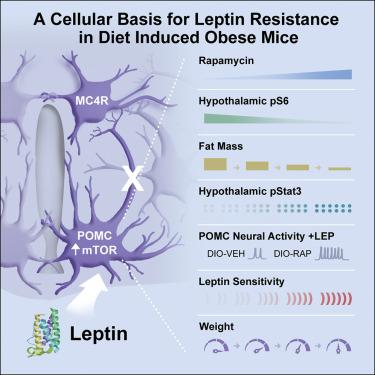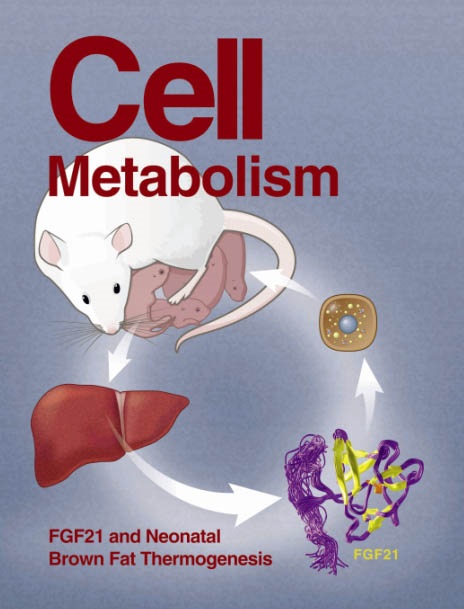A cellular and molecular basis of leptin resistance
IF 27.7
1区 生物学
Q1 CELL BIOLOGY
引用次数: 0
Abstract
Similar to most humans with obesity, diet-induced obese (DIO) mice have high leptin levels and fail to respond to the exogenous hormone, suggesting that their obesity is caused by leptin resistance, the pathogenesis of which is unknown. We found that leptin treatment reduced plasma levels of leucine and methionine, mTOR-activating ligands, leading us to hypothesize that chronic mTOR activation might reduce leptin signaling. Rapamycin, an mTOR inhibitor, reduced fat mass and increased leptin sensitivity in DIO mice but not in mice with defects in leptin signaling. Rapamycin restored leptin’s actions on POMC neurons and failed to reduce the weight of mice with defects in melanocortin signaling. mTOR activation in POMC neurons caused leptin resistance, whereas POMC-specific mutations in mTOR activators decreased weight gain of DIO mice. Thus, increased mTOR activity in POMC neurons is necessary and sufficient for the development of leptin resistance in DIO mice, establishing a key pathogenic mechanism leading to obesity.

瘦素抵抗的细胞和分子基础
与大多数肥胖人类相似,饮食诱导肥胖(DIO)小鼠瘦素水平较高,且对外源性激素没有反应,这表明它们的肥胖是由瘦素抵抗引起的,其发病机制尚不清楚。我们发现,瘦素治疗降低了血浆亮氨酸和蛋氨酸水平,这是mTOR激活配体,这使我们假设慢性mTOR激活可能会降低瘦素信号传导。雷帕霉素,一种mTOR抑制剂,在DIO小鼠中减少脂肪量并增加瘦素敏感性,但在瘦素信号缺陷小鼠中没有。雷帕霉素恢复了瘦素对POMC神经元的作用,但未能减轻黑素皮质素信号缺陷小鼠的体重。mTOR在POMC神经元中的激活引起瘦素抵抗,而mTOR激活物的POMC特异性突变减少了DIO小鼠的体重增加。因此,POMC神经元中mTOR活性的增加对于DIO小鼠瘦素抵抗的发展是必要和充分的,从而建立了导致肥胖的关键致病机制。
本文章由计算机程序翻译,如有差异,请以英文原文为准。
求助全文
约1分钟内获得全文
求助全文
来源期刊

Cell metabolism
生物-内分泌学与代谢
CiteScore
48.60
自引率
1.40%
发文量
173
审稿时长
2.5 months
期刊介绍:
Cell Metabolism is a top research journal established in 2005 that focuses on publishing original and impactful papers in the field of metabolic research.It covers a wide range of topics including diabetes, obesity, cardiovascular biology, aging and stress responses, circadian biology, and many others.
Cell Metabolism aims to contribute to the advancement of metabolic research by providing a platform for the publication and dissemination of high-quality research and thought-provoking articles.
 求助内容:
求助内容: 应助结果提醒方式:
应助结果提醒方式:


